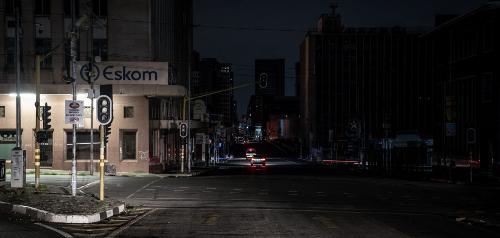South Africa is getting a $1bn loan to tackle power crisis

The World Bank said this week that its board had approved a $1 billion loan to help South Africa reform its energy sector, as the country tries to overcome regular power cuts that have curbed economic growth. The bank wants to support the country's reforms to split struggling power firm Eskom and to transition to a low carbon economy, it said in a statement.
Marie Francoise Marie-Nelly, the World Bank's director for South Africa, had to Reuters last month that the loan was under discussion and could come soon. In Wednesday's statement, Marie-Nelly said reforms the government had launched would "benefit the people of South Africa - particularly the most vulnerable households - the economy, the environment, and advance the energy transition".
Eskom's coal-fired power stations routinely break down, leading to outages of up to 10 hours a day. Several plants breached government emissions regulations earlier this year, according to a Reuters analysis published in September. The World Bank said its Development Policy Loan would contribute to a gradual reduction in water and air pollution by reducing the reliance on coal for power generation.
Points clés à retenir
South Africa has grappled with persistent, scheduled rolling blackouts for several months, stemming from a severe shortage of electricity for its 62 million inhabitants. The state-operated power utility, Eskom, typically responsible for generating around 80% of the nation's electricity through coal-fired power stations, has struggled to meet demand due to issues of mismanagement, corruption, and frequent breakdowns. These challenges have cast a shadow over South Africa's commitment to its climate change targets, prompting President Cyril Ramaphosa to consider delaying the shutdown of some coal stations in response to the electricity supply crisis. The World Bank has recognized the gravity of the situation and has described the loan it is offering as a substantial and strategic response to South Africa's ongoing energy crisis. It also aligns with the country's objective of transitioning towards a more equitable and low-carbon economy. Despite being a continent that contributes the least to global climate change, Africa bears the brunt of its adverse effects. South Africa, as the most advanced economy on the continent, stands as the 16th-largest emitter of greenhouse gases worldwide. Based on 2019 data, it ranks 45th per capita, according to Climate Watch. The nation's energy challenges underscore the complex interplay between development, environmental responsibility, and the pressing need for sustainable solutions.

Nouvelle Frontière
Restez informé des principales actualités et événements sur les marchés africains. Livré chaque semaine.
Pulse54
Une plongée approfondie dans ce qui est ancien et nouveau dans le paysage de l’investissement en Afrique. Livré deux fois par mois.
Événements
Inscrivez-vous pour rester informé de nos webinaires réguliers, des lancements de produits et des expositions.




